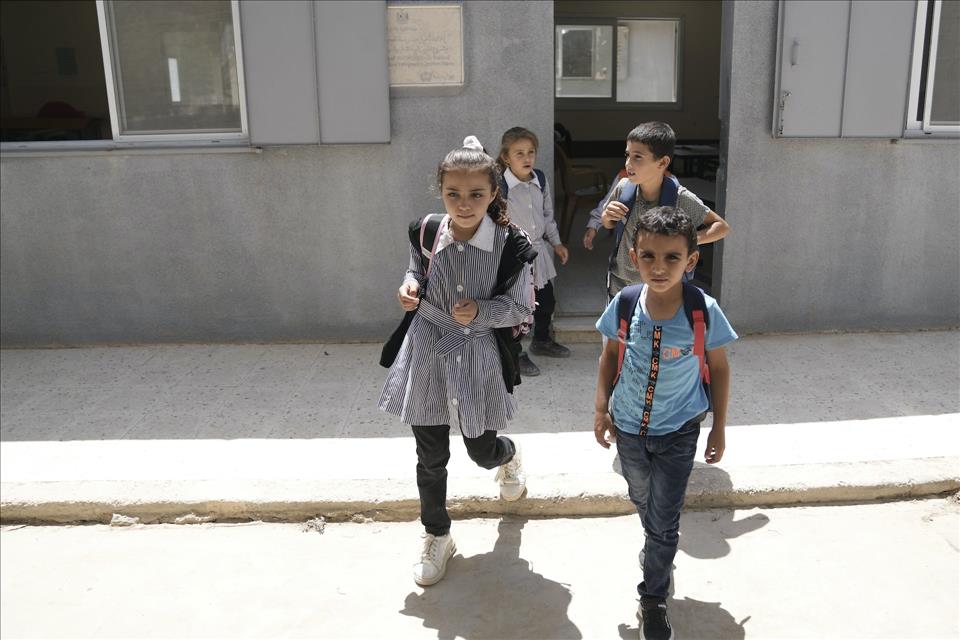
The Scene In The West Bank's Masafer Yatta: Palestinians Face Escalating Israeli Efforts To Displace Them
Considering that in November, settlers threatened to kill anyone who didn't leave the Palestinian village within 24 hours , the hike seems like a small price to pay for Palestinians to remain on their land. But this is not the only community that has been threatened with death if villagers don't leave the land they have lived on for thousands of years.
An Israeli settler jumps on a Palestinian flag that he grabbed from a protester while Palestinian, Israeli and foreign peace activists attempt to open a road in May 2022. (AP Photo/Nasser Nasser)
The region of Masafer Yatta in the occupied West Bank is comprised of many small villages that rely on farming and shepherding to support their families. With illegal Israeli settlements encroaching these villages, often completely surrounding them, villagers find it difficult to grow crops and feed livestock.
Since Oct. 7, it has been nearly impossible for villagers to safely reach their pastures. The Israeli government has emboldened settlers by providing them with arms and recruiting them into the army.
Even when Palestinians successfully resist settler-backed threats of evacuation, their inability to harvest crops or feed their flocks sometimes results in a need to move to urban regions in search of work .
This is a slower version of displacement that often escapes the media. Since Oct. 7, the Israeli human rights organization, B'Tselem, reports that 16 villages in the region have been displaced due to settler violence.
Documenting, preventing violenceI am part of a group of activists from organizations like Mesarvot and The Centre for Jewish Nonviolence who assist in documenting and preventing settler and army aggression.
Often, just the presence of cameras and non-Palestinians is enough to ward off the most extreme forms of violence . However, with an average of seven incidents of settler violence a day since Oct. 7 , the protective presence only goes so far. Sometimes, activists themselves are targeted .
We were in Wadi Tiran in early January 2024 not only to protect against settler violence, but also to ensure the sheep and goats can graze freely .
The polluted stream in Masafer Yatta. (Anna Lippman), Author provided (no reuse)
We pass over a stream so polluted, the water is an opaque milky white. Our Israeli companion explains this water passes through so many cities in the West Bank and becomes so polluted by the time it reaches both Wadi Tiran and the nearby settlements that the Israeli government and Palestinian Authority almost worked together to clean it up.
I am told the plan fell through and feel thankful for the two litres of bottled water I have in my backpack.
We finally descend upon the village and are instantly recruited into a game of soccer happening outside our tent on the uneven hillside. The soccer ball is under-inflated and the material is falling apart, but this does not stop any of the children from scoring goal upon goal on me.
Eventually, I am rescued from the game by Bassam, who lives in the village with his brother and their two families. We are ushered into a tent and drink tea together as an audience of giggling children form around us.
I ask what the loud sound I keep hearing is. Bassam explains it's the sound of fighter jets heading to Gaza. The Israeli activist with us, who acts as translator between our English and Bassam's Arabic, explains we are about 40 kilometres from Gaza and the sounds of fighter jets overhead and faint bombs in the distance have been audible since October.
No construction allowedBecause there are no bathrooms, I wait until nighttime to find a distant rock. With lights from settlements around us shining into the village, and settlers with flashlights walking around the village boundaries, I'm nervous about engaging in even the most basic bodily functions.
I'm told an international human rights group came a few weeks ago to build washrooms, but because Israel does not allow Palestinians in Masafer Yatta to build anything , the project could not happen.
A Palestinian child helps his family dig a cave dwelling in Masafer Yatta in the south Hebron hills in September 2023. (AP Photo/Maya Alleruzzo)
Though this order has stood for several years, the current levels of surveillance and violence make any attempt at building almost impossible. Bassam dreams of building a house for his family, rather than living in tents during the cold winter nights. It's not a lack of will or money that prevents this dream, but rather Israeli government policy.
I return to the tent in time to join the latest game that the kids are attempting to teach us through our language barrier. We teach them how to play musical chairs before several rounds of hot potato.
With the sounds of war in the background and the sights of settlers all around, I was struck at the laughter and joy that filled our tent as we played. Mere weeks ago, settlers had threatened to kill these children and their families if they did not leave their home.
Instead, these children - who have endured so much simply for being born Palestinian - exemplify the struggle and sumud (steadfastness) of existence as resistance.

Legal Disclaimer:
MENAFN provides the
information “as is” without warranty of any kind. We do not accept
any responsibility or liability for the accuracy, content, images,
videos, licenses, completeness, legality, or reliability of the information
contained in this article. If you have any complaints or copyright
issues related to this article, kindly contact the provider above.
















Comments
No comment